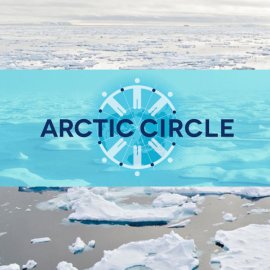Arctic Circle Update, 2018
-
English
-
ListenPause
[intro music] Welcome to World Ocean Radio… I’m Peter Neill, Director of the World Ocean Observatory. The Arctic Circle, the largest convocation of governments, agencies, non-government organizations, academic institutions, and other elements of civil society with interest in the circumpolar Arctic, meets annually in Reykjavik, Iceland, and World Ocean Radio has attending for the past several years to report on the evolution of policy and intervention in that most important part of our ocean world. Here are some thoughts from this year’s event: On the surface, the convocation continues to grow – some 2000 participants, with plenary sessions, panel presentations, and innumerable break-out sessions, workshops, side events, and topical discussions among the many interests involved. The Arctic is, of course, of critical interest today, as a result of the melting of the sea ice and the other emerging consequences of climate change in the far north. The meeting was opening by Olafur Ragna Grimsson, the former President of Iceland and the Founder and Chair of the Arctic Circle, whose dedication and energy have shaped the event from the beginning. He was particularly welcoming of senior representatives of the Arctic Nations: Taro Kono, Foreign Affairs Minister of Japan; US Senator from Alaska, Lisa Murkowski; Sergey Kislyak, immediate past Ambassador of Russia to the United States; senior officials from the European Union, China, France, and Singapore. The presence of these high-level officials is instructive: The Arctic has become more than a remote, alien wilderness, but rather a focus of international concerns for future resources, security, policy and governance. Suddenly, the Arctic is a key geopolitical interest of the major powers, whether or not they are geographical Arctic nations or motivated observers with aspirational interest. Suddenly, the Arctic is a place of more than superficial interest, but rather a strategic place of international concern. This changes the nature of the conversation, more now a posturing of outside institutional interests than a dialogue among constituents concerning their future. The change was curiously palpable. If there was to be “breaking news,” I thought it would come from the presentation by Iceland’s new, young Prime Minister, Katrin Jackobsdottir, who argued that the Arctic is not simply an issue, of local, private concern, but rather an area of planetary concern where we must all come together to protect in the context of sustainable development and peace. She concluded, “This can only be realized by strong commitment to global participation and prosperity and this is why we must make the Arctic a demilitarized zone.” I had never heard anyone make that direct assertion before, and neither had the many others that I questioned about it as a policy goal. I heard no further ripple of impact; perhaps it was picked up in the Iceland press, but it fell in the meeting on listeners with no apparent interest. Another reflection on the meeting comes from my sense of a dramatically lower evident participation of indigenous people from the circumpolar regions. In the past, the audience was alive with attendees in traditional dress; in this instance, I saw only one, a Sami leader who is a regular participant from former events. Where there had been sessions on the social issues and cultural challenges for indigenous peoples, I saw scheduled mostly presentations on science, research, academic studies, and financial innovations, with few if any indigenous presenters among them. As before and after the Circle event, there were major gatherings of indigenous organizations and associations speaking directly to community issues, governance, and aspirations, it seemed as if representatives of those interests had invested their meeting energy elsewhere. The United States, formerly a strong leader and advocate for progressive Arctic studies and management, was notably absent from the presentations and audience. I did meet two young Americans: the first who introduced himself as a representative of the Heritage Foundation, a conservative think-tank in Washington, DC, and asked Russian Ambassador Kislyak a fairly aggressive question regarding Russian regional military build-up; and the second who introduced himself as a Special Advisor for the Arctic for President Donald Trump in a break-out session on economic and infrastructure development. It seemed a consistent but not particularly consequential interest by a major Arctic nation. Finally, there was the ever increasing presence of the Chinese: its concept of a new Polar Silk Road, major investment in icebreakers and scientific research centers and studies, attendance by resource and development managers, even sponsorship of an evening’s celebration of Chinese music and dance. China, Russia, Japan, Singapore – suddenly the Arctic seemed a new outpost and agenda of the east. It felt different. Change was in the air. We will discuss these issues, and more, in future editions of World Ocean Radio. WORLD OCEAN RADIO IS DISTRIBUTED BY THE PUBLIC RADIO EXCHANGE AND THE PACIFICA NETWORK FOR USE BY COLLEGE AND COMMUNITY RADIO STATIONS WORLDWIDE. FIND US WHEREVER YOU LISTEN TO YOUR FAVORITE PODCASTS AND AT WORLD OCEAN OBSERVATORY DOT ORG. [outro music]
This week on World Ocean Radio we provide our annual observations on the Arctic Circle Conference in Reykjavik, Iceland. This year's report highlights not only a seemingly insurgent presence by the Chinese but also a diminished presence by the United States, whose typically consequential interest in the Arctic was lacking. Also noticeably absent from the conversation: a perceived decline of representation by the Arctic's indigenous peoples. We'll discuss these things and more in this week's episode.
About World Ocean Radio
Peter Neill, Director of the World Ocean Observatory and host of World Ocean Radio, provides coverage of a broad spectrum of ocean issues from science and education to advocacy and exemplary projects. World Ocean Radio, a project of the World Ocean Observatory, is a weekly series of five-minute audio essays available for syndicated use at no cost by college and community radio stations worldwide.
Resources from this episode
< About the Arctic Circle | an annual gathering in Reykjavik, Iceland
- Login to post comments



